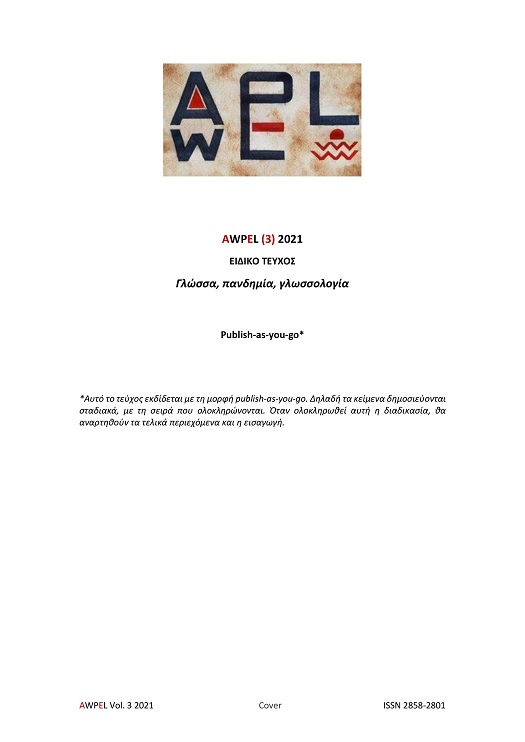Ο διαλεκτικός λόγος στο διαδίκτυο κατά την πανδημία του Covid-19 Η Λεσβιακή στα μέσα κοινωνικής δικτύωσης
Abstract
Η πανδημία του Covid-19 αποτελεί ένα ευρύ και διεπιστημονικό πεδίο μελέτης, καθώς έχει συντελέσει σε μια νέα κοινωνιογλωσσολογική πραγματικότητα αλλά και στην παραγωγή ποικίλων μελετών που σχετίζονται με τις χρήσεις της γλώσσας και την πανδημία. Σε αυτό το πλαίσιο, το παρόν κείμενο παρουσιάζει μια εκδοχή της χρήσης του διαλεκτικού λόγου στην εποχή του Covid-19, όπως αποτυπώνεται στο διαδίκτυο. Το ενδιαφέρον μου έχει επικεντρωθεί στη χρήση της λεσβιακής διαλέκτου, με έμφαση στην ποικιλία της Αγιάσου, στο Facebook, ένα από τα πιο δημοφιλή μέσα κοινωνικής δικτύωσης. Στο παρόν κείμενο επιχειρείται η παρουσίαση και ανάλυση των ευρημάτων σε σχέση με σύγχρονες θεωρητικές αναζητήσεις για τον ρόλο και τις εννοιολογήσεις της χρήσης του διαλεκτικού λόγου στο διαδίκτυο.
Article Details
- Come citare
-
Κουνιαρέλλη Ε. (2022). Ο διαλεκτικός λόγος στο διαδίκτυο κατά την πανδημία του Covid-19: Η Λεσβιακή στα μέσα κοινωνικής δικτύωσης. Aegean Working Papers in Ethnographic Linguistics, 3, 292–313. Recuperato da https://ejournals.epublishing.ekt.gr/index.php/awpel/article/view/30654
- Sezione
- Articles

TQuesto lavoro è fornito con la licenza Creative Commons Attribuzione 4.0 Internazionale.
Authors who publish with this journal agree to the following terms:
Authors retain copyright and grant the journal right of first publication with the work simultaneously licensed under a Creative Commons Attribution licence that allows others to share the work with an acknowledgement of the work's authorship and initial publication in this journal.
Authors are able to enter into separate, additional contractual arrangements for the non-exclusive distribution of the journal's published version of the work (e.g. post it to an institutional repository or publish it in a book), with an acknowledgement of its initial publication in this journal.
Authors are permitted and encouraged to post their work online (preferably in institutional repositories or on their website) prior to and during the submission process, as it can lead to productive exchanges, as well as earlier and greater citation of published work (See The Effect of Open Access).



